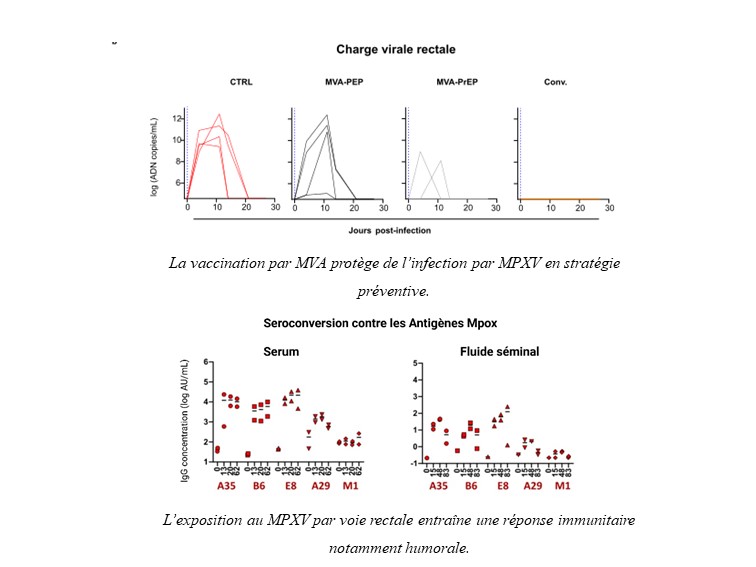The 2022 global monkeypox (MPXV) outbreak was marked by increased transmission during sexual contact, primarily among men who have sex with men. This epidemiological shift highlighted the need to reassess vaccination and prevention strategies.
To address this challenge, IDMIT Department developed an experimental model using non-human primates. The animals were infected rectally with a clade IIb MPXV strain isolated in 2022. This model successfully reproduced several features observed in humans: localized rectal infection, skin and mucosal lesions, systemic viral dissemination, and — most importantly — prolonged viral shedding in semen and rectal fluids, confirming the relevance of this model for studying sexual transmission.
The efficacy of the Modified Vaccinia Ankara (MVA) vaccine, which was already used during the 2022 outbreak, was then evaluated. In a preventive vaccination (PrEP) setting, two doses administered before exposure provided near-complete protection, as demonstrated by:
the absence of significant clinical symptoms,
a strong reduction in rectal viral load (up to 1,000-fold lower than in controls),
the absence of detectable virus in semen,
and effective control of systemic dissemination.
Vaccinated animals exhibited a robust immune response, combining neutralizing antibodies directed against several viral proteins (notably A35, B6, and E8) with coordinated activation of CD4⁺ and CD8⁺ T lymphocytes — a profile comparable to that observed in convalescent animals.
 @ The authors / Nature communications
@ The authors / Nature communications
In contrast, post-exposure vaccination (PEP), administered four days after infection, failed to prevent viral replication or the onset of disease. Rectal and seminal viral loads remained similar to those of control animals, and clinical signs were comparable.
These findings demonstrate that the MVA vaccine is an effective tool for pre-exposure prevention but cannot serve as a reliable post-exposure strategy in the context of sexually transmitted MPXV. They highlight the importance of directing public health policies toward preventive vaccination of the most at-risk populations and call for a rethinking of current PEP protocols.
Contact : Cécile Hérate